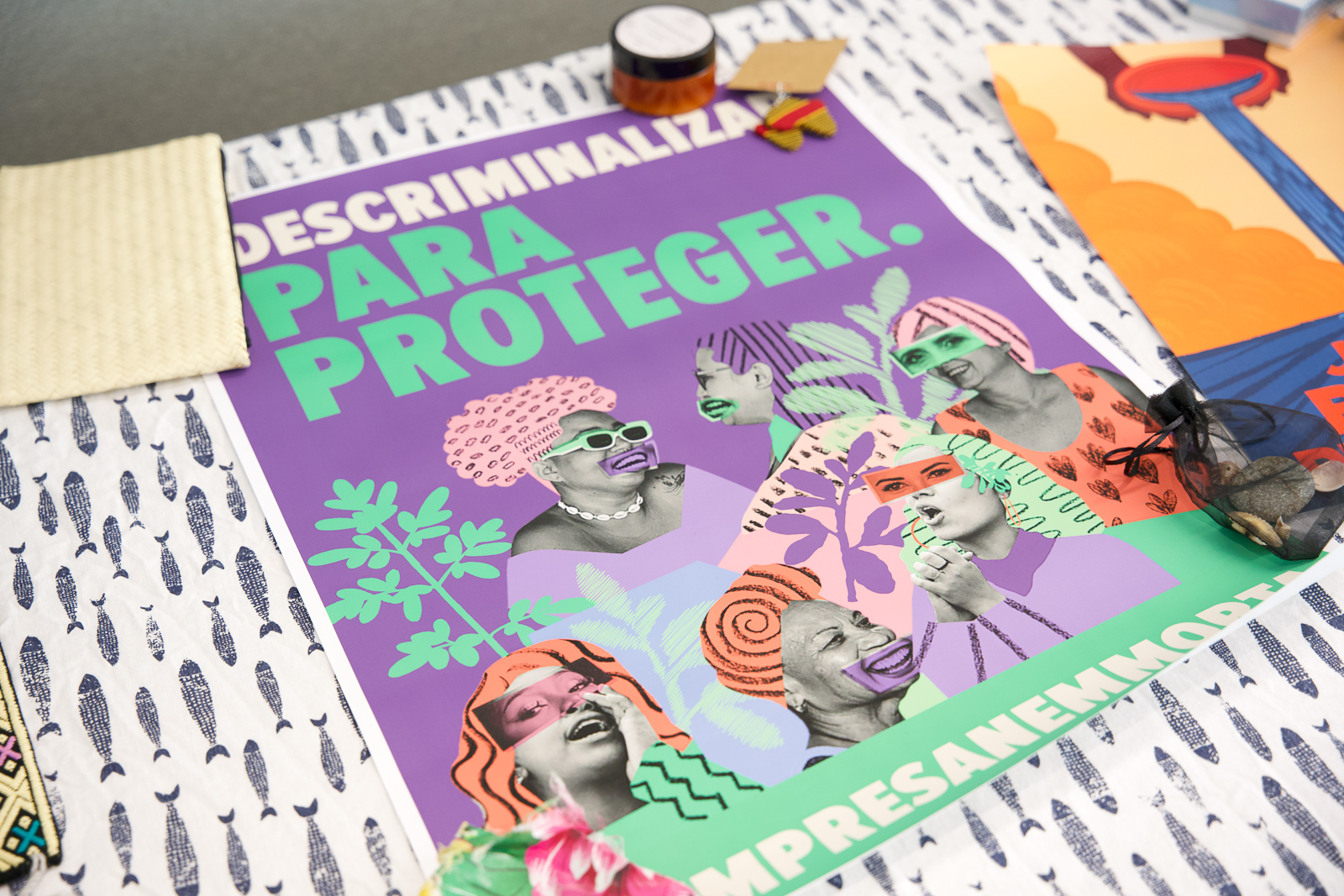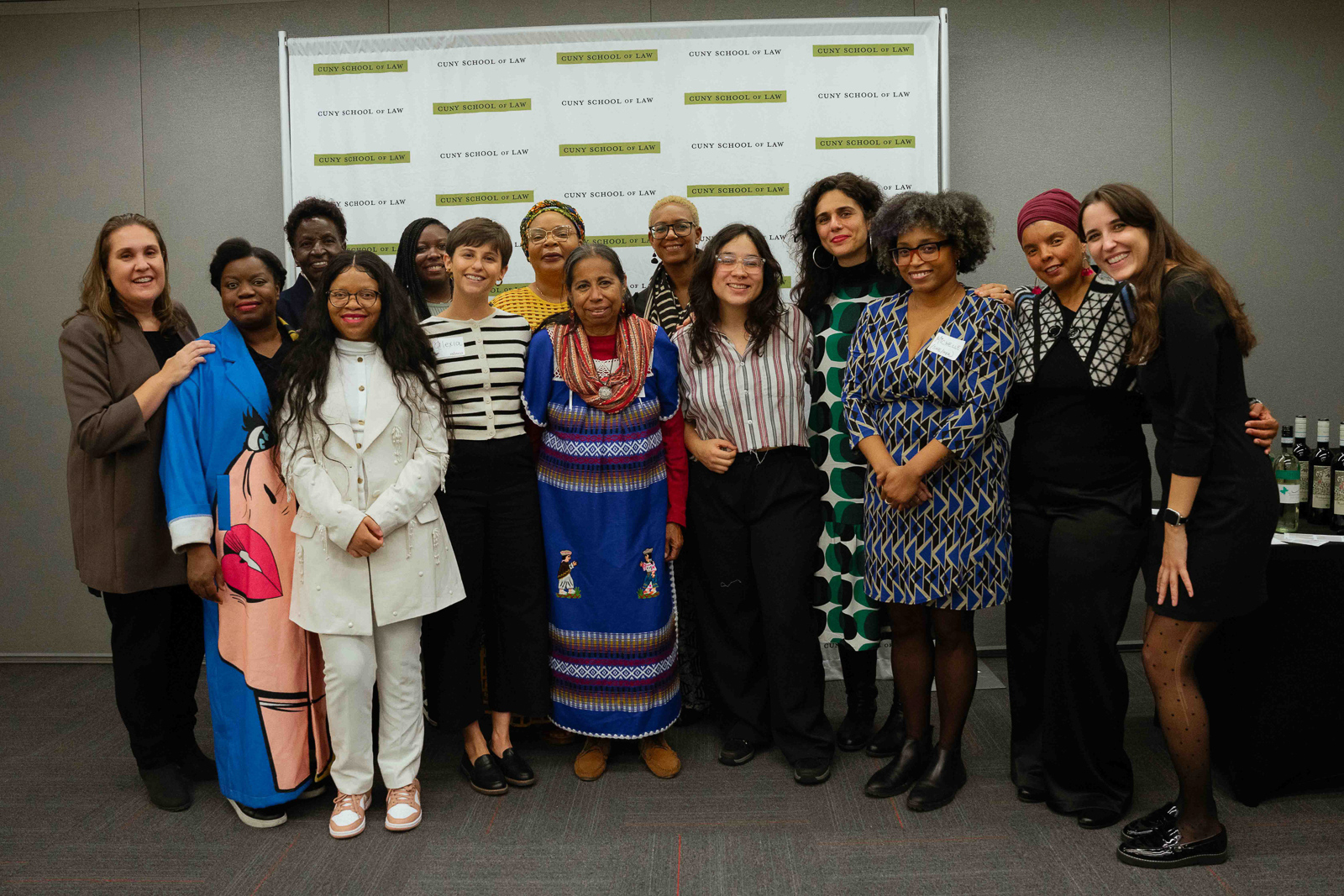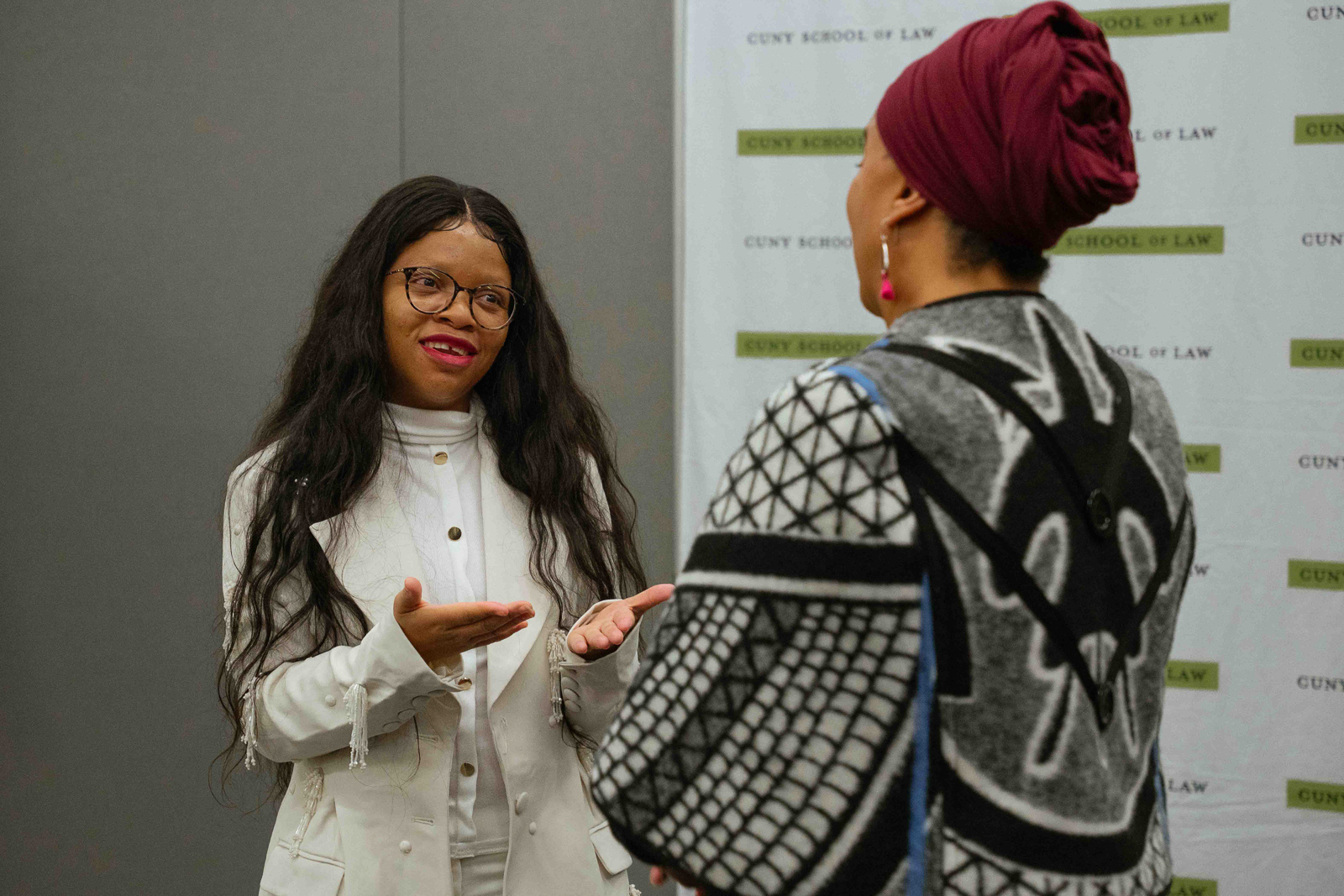Last fall, the Institute brought together experts on peace and gender justice for a workshop to strategize around cross-mobilization and movement solidarity. The group recently reconvened to discuss lessons learned from the Forum and the role of partnerships in documentation work.
BY MOLLY BANGS, PROGRAM MANAGER, AND MIKAELA LUTTRELL-ROWLAND, SENIOR DIRECTOR

Caption: Global Forum workshop materials from activists’ work in movement spaces ranging from reproductive justice to peace and security around the globe.
Photo Credit: Milik Robinson
The Institute on Gender, Law, and Transformative Peace at the City University of New York (CUNY) School of Law hosted its first Global Forum in New York City in November 2023. The workshop brought together activist-scholars, organizers, and grassroots peace activists from around the world to discuss cross-mobilization strategies, ethical documentation practices, and solidarity across movements. This spring, the group recently reconvened virtually to discuss and analyze possibilities for partnerships between movements and academia, and what grassroots activists and organizations need from academia around non-extractive documentation practices.

Alexia Martínez Montalban, Daniela Meza Figueroa, Guerline Jozef, Justina Trim-Nicholson, Mariana Prandini Assis, Mamello Makhele, Michelle Grier, Ruth Ojiambo Ochieng, Sylvia Herrera, Tanya Ansahta, Yasmeen Rubidge, Mikaela Luttrell-Rowland, Leymah Gbowee, and Molly Bangs at the Global Forum.
Photo Credit: Shelby Logan-Reese
Representing nine countries around the globe, the group of activist-scholars was made up of experts in gender-based violence, racial justice, human rights, environmental justice, LGBTQI+ rights, reproductive justice, abolition work, healing justice, immigration, and women, peace, and security. Global and comparative in scope, the Forum’s workshop was designed and facilitated by Yasmeen Rubidge of Leadership Pathways and Institute Senior Director Mikaela Luttrell-Rowland. The connections formed at the Forum are evidence of what a transnational hub of those working on justice issues could look like — and how an academic center like the Institute can both support the work they do, and learn from their collective wisdom.
“The Institute provides space for deep interactions between activists and academia on specific common gender justice issues affecting women, girls, and minority groups across the world, with community women’s voices at the center.”
– Ruth Ojiambo Ochieng
As gender-based violence expert and workshop participant Ruth Ojiambo Ochieng of the Women Situation Room (WSR) Mechanism for Peaceful Elections in Uganda remarks: “The Institute provides space for deep interactions between activists and academia on specific common gender justice issues affecting women, girls, and minority groups across the world, with community women’s voices at the center.”
During the workshop, participants shared a diagnosis of current times, as well as strategies, stories, and experiences. They discussed relationships between academics, activists, and scholar-activists, as well as the ways in which scholarship represents and centers people. The group engaged in a critical discussion around agency at community and local levels. As Sylvia Herrera of PODER, an environmental justice organization in Austin, put it, “Many times, communities are approached with a set agenda of a research topic and the investigator is looking for subjects to interview… [But] we’re not subjects, we are participants.”

Workshop participant Mamello Makhele converses with Global Forum facilitator Yasmeen Rubidge. Mamello is a registered nurse midwife and Fulbright Scholar currently pursuing an MPH in Maternal and Child Health at the University of Nebraska Medical Center. She advocates for access to sexual and reproductive health and rights through her work leading SheDecides in Lesotho and as co-founder of the Barali Foundation.
Photo Credit: Milik Robinson
The group reflected on the important role places like the Institute can have in this moment of a rise of global inequity, war, gender-based violence, and a concerted backlash to human rights, including growing anti-gender attacks. They discussed how integrating voices from communities and activists on the front lines of movements and peace work into academic and policy is not just vital, but also requires shifting of narratives. The group shared cross-learning at the workshop across movements and geographies, about specifically located innovations used by organizers and movements, as well as the challenges they face — as well as how to sustain and grow the work. Workshop participants and facilitator Yasmeen Rubidge spoke of the importance of bringing joy and authenticity into movement spaces, while centering healing, care, purpose, and why activists do this work.
Professor Tanya Ansahta Garnett of the University of Liberia, who works on women, peace, and security and gender justice, noted, “[This forum] was an excellent opportunity for activists and scholars to… understand how our work and struggles are more alike than they are different, despite our different contexts. Interpersonal connections and relationship building was central to the forum.”
Institute Global Forum participant Alexia Martínez Montalban of the Instituto de Derechos Humanos Ignacio Ellacuría SJ, Universidad Iberoamericana Puebla in Mexico, a human rights defender who works with families of disappeared people, reflected that because of the Institute’s convening, “I was able to meet several activists and scholars who taught me a lot about how to work for justice in different parts of the world. Listening to them inspired me to keep working and fighting for justice in my country.” She went on to note that the Institute is unique in the ways it “creates collaborative work between us that can strengthen our work.”

Guerline Jozef speaks during the Institute’s Global Forum. Guerline is Executive Director and Co-Founder of the Haitian Bridge Alliance, a U.S.-based nonprofit organization that advocates for fair and humane immigration policies, with a particular focus on Black immigrants from the Caribbean and Africa, the Haitian community, women and girls, LGBTQIA+ individuals, and survivors of torture and other human rights abuses.
Photo Credit: Shelby Logan-Reese
Four months after the Global Forum, the scholar-activist group reconvened virtually to reflect on the workshop and to reinvigorate partnerships around questions of ethical documentation practices. They considered what academia or a place like the Institute owes to activists and organizers and to people on the ground, and what accountability in documentation and co-knowledge production could and does look like. The conversation was grounded in bell hooks’ teachings: “To be truly visionary we have to root our imagination in our concrete reality while simultaneously imagining possibilities beyond that reality.”
Wisdom shared included reflections around how documentation feeds memory. Activist Daniela Meza Figueroa, of Chicas Al Frente, a gender justice group in Costa Rica, discussed the many tools and mediums that can be used to do so, from audiovisual and voice to photography. Justina Trim-Nicolson of Collective Power for Reproductive Justice noted, “It feels important to acknowledge and honor the work being done on the ground.” She gave an example of an organization she worked with that sat at the intersections of academia and activism that undertook intentional interview sessions with its team, noting that this was an effective way to “document and archive but also lift up the incredible work [the organization] led over decades.” Along those lines, immigrant justice advocate Guerline Jozef of the Haitian Bridge Alliance added that there’s a need for academia to engage with impacted people not “as a case study, but as a true collaboration [that] respectfully centers the voices of the people not just [as] the ‘subject.’”

Michelle Grier, Director of the Center for Wellbeing and Happiness at the Lower East Side Girls Club, in conversation with Sylvia Herrera, Health & Environmental Justice Advisor to PODER – Austin, and Alexia Martínez Montalban of the Instituto de Derechos Humanos Ignacio Ellacuría SJ, Universidad Iberoamericana Puebla in Mexico. Photo Credit: Milik Robinson
Additionally, the group discussed ways in which higher education and legal education can engage in meaningful scholar-activist listening practices. Professor Mariana Prandini Assis of the Universidade Federal de Goiás contributed, “Knowledge production [should be] guided by the needs of movements rather than self-referential questions produced according to academic standards.”
Learnings from both the documentation session and the Global Forum will inform the Institute’s research, documentation, and practices moving forward. The connections established at the Global Forum and thereafter have been cemented in the months following the workshop. The March group meeting promised ripple effects to the possibilities that lie ahead.
